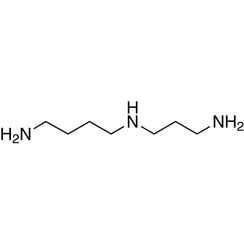You have no items in your shopping cart
Spermidine
€66,94
Excl. tax
Spermidine is a polyamine compound (C7H19N3) found in ribosomes and living tissues, and having various metabolic functions within organisms. It was originally isolated from semen.
Uses
- Spermidine can be used in electroporation while transferring the DNA into the cell under the electrical impulse. May be used for purification of DNA-binding proteins.
- Spermidine is also used, along with calcium chloride, for precipitating DNA onto microprojectiles for bombardment with a gene gun.
- Spermidine has also been reported to protect the heart from aging and prolong the lifespan of mice, while in humans it was correlated with lower blood pressure. It also was found to reduce the amount of aging in yeast, flies, worms, and human immune cells by inducing autophagy.
- Spermidine is commonly used for in vitro molecular biology reactions, particularly, in vitro transcription by phage RNA polymerases, in vitro transcription by human RNA polymerase II, and in vitro translation.
- Spermidine increases specificity and reproducibility of Taq-mediated PCR by neutralizing and stabilizing the negative charge on DNA phosphate backbone.
- Spermidine is, at physiological pH, a polycationic reagent that aids in enzyme digestion by forcing apart DNA molecules.

